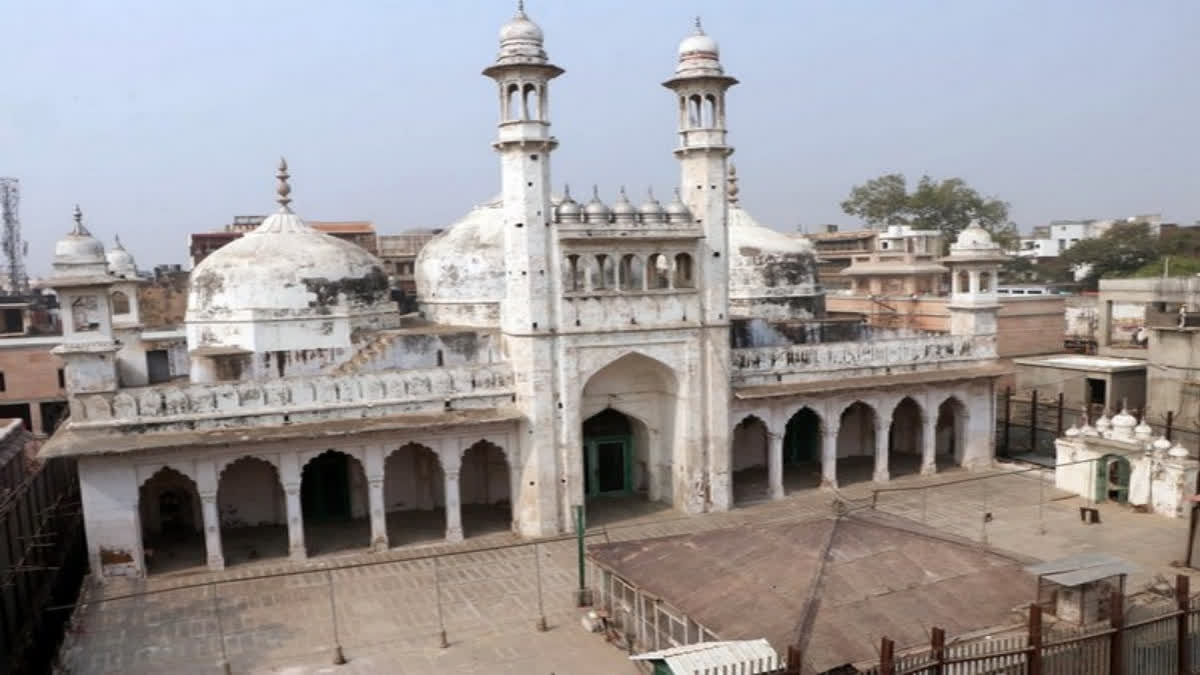Varanasi (Uttar Pradesh): The Gyanvapi case, which has garnered significant attention and sparked heated debates across different judicial levels, took a new turn as the Varanasi district court decided to consolidate seven related petitions for a joint hearing.
This move aims to prevent contradictory judgments and ensure a fair and unified approach to resolving the complex legal matter. The decision came in response to a plea by the Hindu plaintiffs to conduct an archaeological survey of the entire Gyanvapi complex, including the revered Shivling.
The controversy surrounding the Gyanvapi case began when an alleged black stone resembling an ancient Shivling was discovered during a commission survey at Vajukhane within the Varanasi-based Gyanvapi campus on May 16, 2022. The defendant party swiftly petitioned the court to seal the stone, claiming it to be the ancient Shivling of Aadhi Visheshwar. Subsequently, the entire complex was sealed pending legal proceedings. In response to a plea by the Hindu side, the High Court had recently ordered the Archaeological Survey of India (ASI) to conduct a survey using traditional methods. However, the Supreme Court later imposed a ban on the survey.
Amidst these developments, the respondent party also appealed to the District Court to conduct a comprehensive survey of the entire premises. The court has scheduled the hearing for these cases on July 7, the day after the next hearing at the Supreme Court. Moreover, the court has mandated that all seven petitions will be heard together, aiming to ensure a cohesive examination of the matter.
Also Read: Gyanvapi case: Muslim side submits written objection to ASI investigation of entire mosque premises
The seven cases set for the joint hearing encompass a range of demands and concerns from both sides involved in the dispute. They include:
Seeking evidence from the Archaeological Survey Department to investigate the Ground Penetrating Radar (GPR) method concerning the remaining remnants of the ancient Adi Vishweshwar-Kashi Vishwanath temple, despite its destruction.
Demanding a scientific investigation through archaeological survey techniques of the western wall of the temple constructed in the Nagara style.
Requesting a scientific investigation of various cellars within the premises.
Urging an investigation into the alleged Shivling that appeared in Vajukhana within the Gyanvapi mosque on May 16.
Exploring the investigation of a half-cut marble statue situated five feet from the staircase within the alleged Gyanvapi mosque premises.
Examining the construction of all three domes atop the 20-feet-high temple wall, particularly regarding the absence of a dome foundation, with claims that Aurangzeb merely placed a round cap on top.
Investigating the contentious act of constructing a mosque by sealing the entrance of Adi Vishweshwar Mahadev with massive stones, thereby disrupting the original sanctum sanctorum and destroying a significant cultural heritage.
Also Read: SC defers scientific survey to determine age of 'Shivling' found at Gyanvapi mosque
Meanwhile, the Varanasi district court, through its special powers, consolidated the cases despite objections from the opposition, as confirmed by Rajesh Mishra, the special advocate for Gyanvapi and Adi Vishweshwar cases. Citing Order 4A of the Code of Civil Procedure (CPC), the judge emphasized the importance of joint hearings to avoid contradictory judgments or orders. It was reasoned that consolidating the cases in one court would ensure consistency and uphold the principles of justice.
The decision to consolidate the cases was not without opposition, as Advocate Mohammad Tohid Khan, representing the Muslim side, argued that the Gyanvapi-related issues had not yet reached a stage where a joint hearing was necessary. Khan suggested that the court should first evaluate the evidence in each case separately before making such a decision.
As of now, the court should have seen the evidence of all the cases. Had the evidence been the same, then it would have been just to give such a verdict, Khan said. Litigants in the Shringar Gauri-Gyanvapi case are Lakshmi Devi, Rekha Pathak, Sita Sahu and Manju Vyas -- had urged the court to hear the seven cases together.
